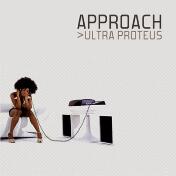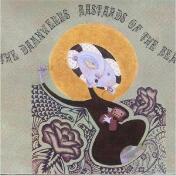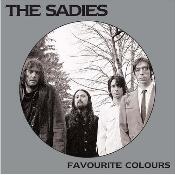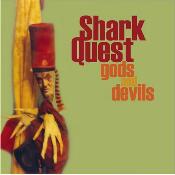4 Music Reviews
by dave heaton
Approach, Ultra Proteus (Coup d'Etat)
 Early on in Ultra Proteus, Approach claims to be kicking "intelligent facts over 70s
funk tracks." And while the first claim is a bit shakey - he's more likely to build a track
around a sentiment like "move your body tonight" than anything cerebral - the second one
is undisputable. This Lawrence, Kansas-based MC loves to ride funk and soul music
completely indebted to the 70s, with thick bass lines, guitar grooves, and occasionally a
bright horn section, all played by a tight, live band. Over all of this Approach rhymes in a
manner so casually sharp that the skill of it is almost easy to overlook at first. His talent is
less in writing witty lines or wowing you with verbal acrobatics, more in placing his voice
naturally over the track and rhyming with energy and sincerity. This is a streamlined
album, with no filler and nothing pretentious or showy. Approach sounds driven to make
music that'll mean something to his listeners, that'll move their hearts and feet in the way
that classic funk, soul and jazz of the past clearly move him. Yet the overall impression
one gets from the album has to do with its style and sound than any particular idea or
emotion that Approach expresses - if you're into smooth funk and like losing yourself in a
groove, this will be right up your alley. (Note: The CD includes bonus remixes of 5 of the
album's tracks, most notably a sophisticated and evocative take on the title track by ID of
Archetype.)
Early on in Ultra Proteus, Approach claims to be kicking "intelligent facts over 70s
funk tracks." And while the first claim is a bit shakey - he's more likely to build a track
around a sentiment like "move your body tonight" than anything cerebral - the second one
is undisputable. This Lawrence, Kansas-based MC loves to ride funk and soul music
completely indebted to the 70s, with thick bass lines, guitar grooves, and occasionally a
bright horn section, all played by a tight, live band. Over all of this Approach rhymes in a
manner so casually sharp that the skill of it is almost easy to overlook at first. His talent is
less in writing witty lines or wowing you with verbal acrobatics, more in placing his voice
naturally over the track and rhyming with energy and sincerity. This is a streamlined
album, with no filler and nothing pretentious or showy. Approach sounds driven to make
music that'll mean something to his listeners, that'll move their hearts and feet in the way
that classic funk, soul and jazz of the past clearly move him. Yet the overall impression
one gets from the album has to do with its style and sound than any particular idea or
emotion that Approach expresses - if you're into smooth funk and like losing yourself in a
groove, this will be right up your alley. (Note: The CD includes bonus remixes of 5 of the
album's tracks, most notably a sophisticated and evocative take on the title track by ID of
Archetype.)
The Damnwells, Bastards of the Beat (Epic)
 There's a conflict in the Damnwells' first full-length Bastards of the Beat, and it's
laid out in front of us on the first two tracks. First up is "Assholes," a beautiful sketch of a
song that has a ghostly sound and a style remiscent of Whiskeytown or Uncle Tupelo.
That quickly segues into "What You Get," an arena rock rave-up similar to the Goo Goo
Dolls before they got too in love with themselves. To my ears the first song is lovely and
evocative, the second song has some energy but is ultimately quite bland and pedestrian.
Most of Bastards of the Beat lies somewhere between these two extremes; the
album is filled with country-rock ballads that tread the line between heartfelt and mundane.
A few tracks stand out like diamonds: the stunningly spare, slightly goofy but completely
sincere love song "I Will Keep the Bad Things From You"; "Sleepsinging," where a
slightly dream-like backdrop melts into a power crunch around lead singer Alex Dezen,
who sings a great melody in a raw way; the casually catchy, radio-ready "The Lost
Complaint;" and the sublime closer, a long-distance love song called "Texas." The
Damnwells are at their best when they kept things loose and leave room for a sense of
mystery in their songs, which they do about half the time on Bastards of the Beat.
They're a group with a lot of promise, even if this album isn't a complete
success.
There's a conflict in the Damnwells' first full-length Bastards of the Beat, and it's
laid out in front of us on the first two tracks. First up is "Assholes," a beautiful sketch of a
song that has a ghostly sound and a style remiscent of Whiskeytown or Uncle Tupelo.
That quickly segues into "What You Get," an arena rock rave-up similar to the Goo Goo
Dolls before they got too in love with themselves. To my ears the first song is lovely and
evocative, the second song has some energy but is ultimately quite bland and pedestrian.
Most of Bastards of the Beat lies somewhere between these two extremes; the
album is filled with country-rock ballads that tread the line between heartfelt and mundane.
A few tracks stand out like diamonds: the stunningly spare, slightly goofy but completely
sincere love song "I Will Keep the Bad Things From You"; "Sleepsinging," where a
slightly dream-like backdrop melts into a power crunch around lead singer Alex Dezen,
who sings a great melody in a raw way; the casually catchy, radio-ready "The Lost
Complaint;" and the sublime closer, a long-distance love song called "Texas." The
Damnwells are at their best when they kept things loose and leave room for a sense of
mystery in their songs, which they do about half the time on Bastards of the Beat.
They're a group with a lot of promise, even if this album isn't a complete
success.
The Sadies, Favourite Colours (Yep Roc)
 Country-rockers
The Sadies have certainly shown an interest in the music of the 1960s before, but not until
now have they thrown themselves into the must of the past so wholeheartedly. With
Favourite Colours they've adopted a certain hippie-ish, rustic Americana vibe,
heavily influenced by late 60s Byrds, the Band, early Grateful Dead, early Allman Brothers
(the album's lead-off instrumental "Northumberland West" is very Allmanesque) and
psychedelia. Whether they're offering an oblique folksong-story of power, greed and war
("1000 Cities Falling") or slowly tripping away ("The Iceberg"), they definitely sound like
they've been living in the woods and getting in touch with their inner love children. And
they're good at it - much like The Sixth Great Lake's Up the Country, Favourite
Colours is a successful imitation of a particular attitude, feeling, and sound drawn
from classic albums of the past. If you're looking for something fresh-sounding, though,
you'll find yourself satisfied only in the moments where styles collide - for example, how
"Translucent Sparrow" shifts into an orchestral pop song partway through, or the unique,
slightly off-kilter quality that guest vocalist Robyn Hitchcock brings to the closing track
"Why Would Anybody Live Here?" During much of the album I find myself thinking about
the better bands and albums that this was inspired by, but in these few, more surprising
moments I find myself intrigued.
Country-rockers
The Sadies have certainly shown an interest in the music of the 1960s before, but not until
now have they thrown themselves into the must of the past so wholeheartedly. With
Favourite Colours they've adopted a certain hippie-ish, rustic Americana vibe,
heavily influenced by late 60s Byrds, the Band, early Grateful Dead, early Allman Brothers
(the album's lead-off instrumental "Northumberland West" is very Allmanesque) and
psychedelia. Whether they're offering an oblique folksong-story of power, greed and war
("1000 Cities Falling") or slowly tripping away ("The Iceberg"), they definitely sound like
they've been living in the woods and getting in touch with their inner love children. And
they're good at it - much like The Sixth Great Lake's Up the Country, Favourite
Colours is a successful imitation of a particular attitude, feeling, and sound drawn
from classic albums of the past. If you're looking for something fresh-sounding, though,
you'll find yourself satisfied only in the moments where styles collide - for example, how
"Translucent Sparrow" shifts into an orchestral pop song partway through, or the unique,
slightly off-kilter quality that guest vocalist Robyn Hitchcock brings to the closing track
"Why Would Anybody Live Here?" During much of the album I find myself thinking about
the better bands and albums that this was inspired by, but in these few, more surprising
moments I find myself intrigued.
Shark Quest, Gods and Devils (Merge)
 I'll be honest, when it comes to instrumental music I tend to go most ga-ga over music
that is way out there on an experimental level or music that is sublimely overloaded with
atmosphere, though a keen melodic sense can sometimes be enough. The North Carolina
group Shark Quest does not attempt innovation, but they do take a familiar sense of
atmosphere - the vageuly Western, Ennio Morricone-type vibe - and form it into songs
that are melodic and filled with energy. That last quality makes them resemble an
instrumental rock outfit (The Ventures, etc.) more than one of today's more abstract
"post-rock" groups...but their songs are ultimately less simple than you might expect by
my referring to them as a rock band. The songs on their third album Gods and
Devils, most of which were created as accompaniment for the screening of a work by
animator Bruce Bickford, have a sense of straightforward motion to them, but will
surprise you with piano asides and eclectic instrumentation (cello, mandolin, marimba, and
a water bottle used as percussion). The generally long songs unfold in interesting ways,
with a nice array of textures and sounds. I can't imagine someone being knocked to the
floor by Shark Quest the way you can be by more overtly explosive instrumental acts, yet
there's a lot going on here.
I'll be honest, when it comes to instrumental music I tend to go most ga-ga over music
that is way out there on an experimental level or music that is sublimely overloaded with
atmosphere, though a keen melodic sense can sometimes be enough. The North Carolina
group Shark Quest does not attempt innovation, but they do take a familiar sense of
atmosphere - the vageuly Western, Ennio Morricone-type vibe - and form it into songs
that are melodic and filled with energy. That last quality makes them resemble an
instrumental rock outfit (The Ventures, etc.) more than one of today's more abstract
"post-rock" groups...but their songs are ultimately less simple than you might expect by
my referring to them as a rock band. The songs on their third album Gods and
Devils, most of which were created as accompaniment for the screening of a work by
animator Bruce Bickford, have a sense of straightforward motion to them, but will
surprise you with piano asides and eclectic instrumentation (cello, mandolin, marimba, and
a water bottle used as percussion). The generally long songs unfold in interesting ways,
with a nice array of textures and sounds. I can't imagine someone being knocked to the
floor by Shark Quest the way you can be by more overtly explosive instrumental acts, yet
there's a lot going on here.
Copyright (c) 2005 erasing clouds |
|